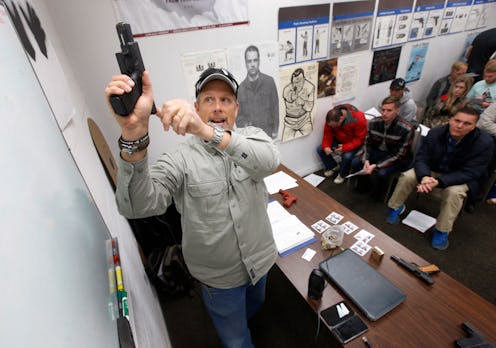News
The House Voted To Make Traveling With Guns Way Easier

The National Rifle Association landed a victory on Wednesday when federal lawmakers approved of one NRA-pushed piece of gun legislation. The House voted 231-198 in favor of a concealed carry bill permitting gun owners to travel with weapons to other states. Should the bill become law, people allowed to carry concealed handguns could legally bring them into states that restrict concealed carry to residents only.
Gun owners who support the GOP bill say their rights to carry a gun shouldn't end at state borders and that the new concealed carry rule protects them from civil suits. The bill's author, Rep. Richard Hudson (R-NC), argued on the floor that concealed carry permits are like marriage or driver licenses — they should still be valid when you cross a state border. Opponents like Rep. Elizabeth Etsy (D-CT), who represents Newton — the town where a gunman shot to death 26 children and staffers inside Sandy Hook Elementary School — called the bill "an outrage and an insult to the families" of people killed by gun violence. Rep. Joe Kennedy III (D-MA) seemed to agree when he tweeted that Massachusetts' "responsible, bipartisan gun laws are saving lives" and that GOP lawmakers are trampling on the state's rights.
The votes on the bill passed mostly along party lines, Republicans in favor and Democrats against. Democrats against the bill, including House Minority Leader Nancy Pelosi (D-CA), pointed out that concealed carry requirements vary by state and that the new law would force states with strict laws to accept weaker standards from other states. Currently, 13 states do not require a permit to carry a firearm: Alaska, Arizona, Arkansas, Idaho, Kansas, Maine, Mississippi, Missouri, New Hampshire, North Dakota, Vermont, West Virginia, and Wyoming. Additionally, more than half of all states do not require live-fire training. In other words, you wouldn't need to know how to shoot a gun to apply for a concealed carry permit.
But, surprisingly, the gun legislation package wasn't all bad news for gun control activists. Along with the new concealed carry rule, the bill attached two bipartisan measures: one to strengthen the national background checks system, and another to study crimes involving bump stocks over six months. Six centrist Democrats approved the gun legislation package because they supported the background check measure while 14 Republicans, a mix of centrists and conservatives, voted "no" for the opposite reason.
The one bill in the gun legislation package would force authorities to report criminal history records to the National Instant Criminal Background Check System and penalize government agencies that don't report to the FBI. In fact, that part of the legislation package is a direct response to November's mass shooting at First Baptist Church in Sutherland Springs, Texas. The shooter was prohibited from buying or possessing firearms because of a domestic violence conviction while serving in the U.S. Air Force. But the Air Force failed to report his criminal history and this information was not in the federal database used for gun background checks.
The third bill in the package is a response to the October mass shooting in Las Vegas, where a gunman opened fire on a country music festival, killing 58 people and injuring more than 500 others. Law enforcement authorities believe the shooter used bump stocks to modify his weapons, making them fire more rapidly like a fully-automatic weapon. The bill would require the Justice Department to report to Congress the number of times a bump stock has been used in a crime. But the Justice Department and the Bureau of Alcohol, Tobacco, Firearms and Explosives is already reviewing whether firearm regulations should include a ban on bump stocks "converting a weapon into a machine gun," Attorney General Jeff Sessions announced a day before the gun package legislation vote.
After passing in the House, the gun package legislation will have to go to the Senate and then, if passed, President Trump's desk.